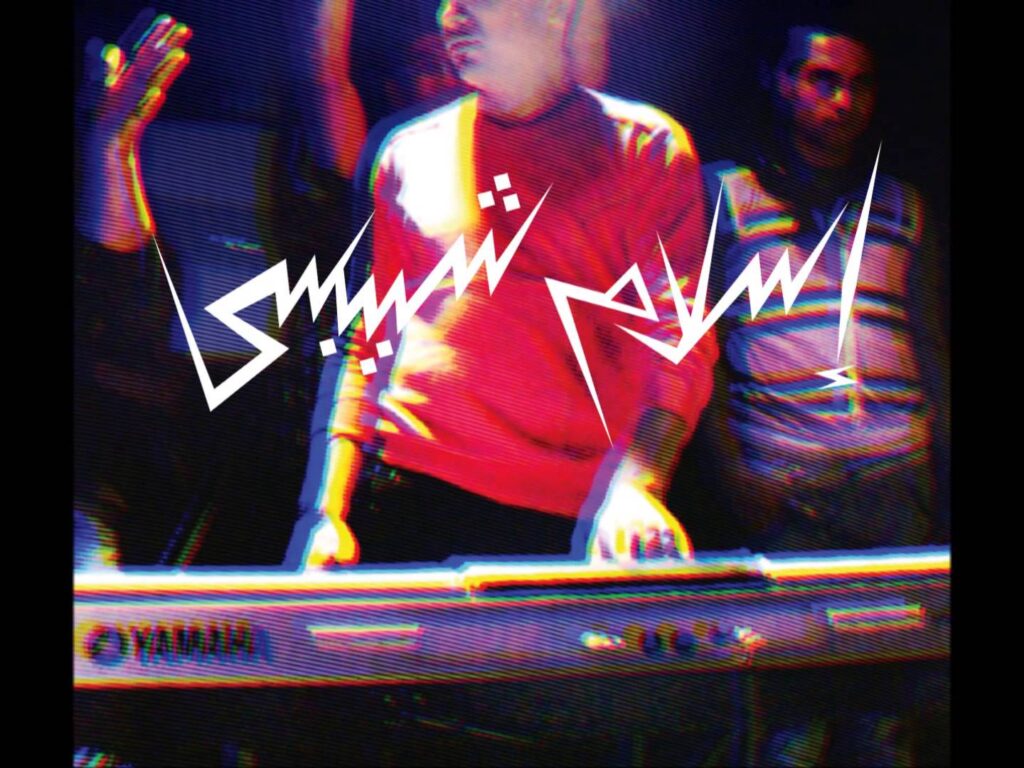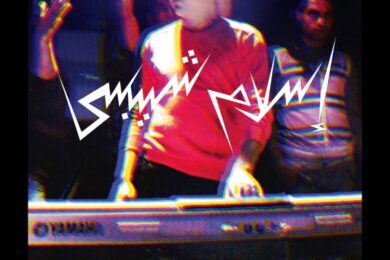There’s a difference between good live records and great live records. Good live records, like It’s Alive by The Ramones, capture the sound of a band at their best. But great live records also seem to carry the social structures the music comes from. Musical history and political history interfere. Sound seems to be more than just the resonance of moving air. The waves seem to be part of a bigger movement.
From now on the Cairo High Cinema Institute can be placed in the same lineage as San Quentin, CBGB and The Village Vanguard: legendary places where great records that connected with a regional scene were recorded. Live At The Cairo High Cinema Institute is the perfect orgasm where everything comes together.
What do you do when you can’t play your music anywhere and you’re also not allowed in clubs? Out of frustration CHIC wrote ‘Le Freak’, Chuck D started a band, punkers started squatting and ravers took to the fields. A new youth movement in Egypt (electro chaabi) effected the smartest and weirdest move ever: they took over weddings and started throwing parties. But the sound on this live album is more like Aphex Twin taking over the decks at your boring nephew’s wedding and playing his fucked up version of easy listening classic ‘Popcorn’. (NB: I’m not lying, it genuinely sounds like that.) So you can now play this sound – that previously only existed in the West through short and truncated YouTube clips – at home on your stereo. It’s now available on good old limited edition red vinyl via the Nashazphone label.
Nashazphone is an Egyptian/Algerian record label. Cairene owner Hicham Chadly is a fan of esoteric rock and noise and organised the first ever show by drone metal giants Sunn O))) in Paris. The debut release on his label was by Sun City Girls, an experimental rock group with international influences. These new Egyptian recordings seem to combine Chadly’s aesthetic leanings and connectivity at their best. His aesthetic forms an important connection between the Arab underground scene (that’s underground because of its radical content) and the Western underground (that’s underground because of its radical form). From the angle of Western – or Westernised – experimental music history, Chadly curates the best currents from Cairo’s musical streams. To Western ears the EEK/Chipsy album sounds like a total avant-garde statement. In Cairo it’s street wedding music. Both of these recordings showcase two different directions of this other, newer, better EDM: Egyptian Dance Music.
The Islam Chipsy release is a live recording, and is one of the best live recordings ever. The DJ Sardena record is also excellent within the genre, but it’s not groundbreaking like the Chipsy one. The Sardena studio is home to a number of DJs and producers from the Matariya district of Cairo. The sound is quite stripped back, but also very melodic. The DJ Sardena LP captures some great tunes, is psychedelic, and features some of the best producers and MCs in the scene, but sonically and lyrically its contents aren’t genre defining like some other electro chaabi tracks are. However, Chadly’s selections are still good. This vinyl release helps open up a genre that developed in relative isolation to DJs who can mix it with similar sounds. And the physical archiving connects with the different requirements and fetishes of Western audiences.
Though the recent, excellent Electro Chaabi documentary by journalist and activist Hind Meddeb gathers wedding artists like Islam Chipsy AND "mahraganat" (Arabic for "festival") artists like Oka & Ortega, Sadat & Alaa Fifty Cent and DJ Sardena all under the name ‘electro chaabi’, they aren’t really the same thing; it’s more that they’re two sides of the same coin. Both sounds – Chipsy’s new wave chaabi or Nile Delta synth, and Sardena’s electro chaabi – flow from the change of social structures in Egypt which has disrupted existing power structures (to a certain degree) and created a whole new way of distributing art, politics and philosophy. But there are also fundamental differences.
First of all, Islam Chipsy does not want to be associated with the maghranat movement. He comes from the Imbaba neighborhood, which is in the heart of Cairo. The mahraganat sound that DJ Sardena represents comes from the fringes, from El Salaam City. In Western terms you could say that Islam Chipsy is a modernist artist who works in a linear tradition. By first mastering the tradition, he was then free to re-invent this tradition as it related to keyboard playing. It’s pure, violent virtuosity. Traditional piano players use all their fingers to play a chord. House music revolutionised this, by allowing the producer to use only one finger. Chipsy introduced a new approach: he fires tone clusters with his fists, palms and edges of his hands all over the keyboard, and slamming down the keys, but still in a virtuosic way.
Mahraganat seems to belong to a more post-modern approach. It utilises satire and pastiche in the lyrics, and relies on sampling from other sources and the use of cheap cracked software like FruityLoops. The style is much more lo-fi, more anti-establishment. (It is merely the production or recording of Chipsy that is lo-fi.)
The Islam Chipsy record is extremely exciting to listen to; it is explosively extrovert and encourages extravagant euphoria. The keyboards sound like sirens. The drums, played by Khaled Mando and Islam Tata, sound like a marching band on speed. It is psychedelic and pumping. It is tight and distorted. Sometimes the singer cheers and yells, and the audience can be heard going mad. The audience’s effervescence adds an extra rhythmic layer to the recording. At first the combination sounds like pure noise, but after listening several times, there seems to be a very smart compositional sense lurking beneath. Sometimes he even plays the keys like Metallica’s Kirk Hammett plays the guitar on ‘One’.
The format, vinyl, is not regular in electro chaabi. Normally, because the mass media is state censored, the music is distributed as MP3s via Mediafire. Luckily Chadly, like a modern day Alan Lomax, captured the street vibe which could have been lost forever, because the recordings do not represent the sound Chipsy himself is searching for on his own releases. The MP3s on his Facebook profile (where he’s called Eslam Chipsy) sound more like the slick extravagance of Eurotrance.
On the other hand, this distorted wedding noise seems to be a product of sonic limitations and necessity: mainly the battle against a cheap, overdriven sound system. But it just so happens to fit in perfectly with our Western ideas about lo-fi, power electronics and noise. It is similar to the way that that Western listeners respond to the raw Sublime Frequency compilations of Syrian dabke hero Omar Souleyman, the Tannoy-produced distortion of Congolese group Konono No. 1 and the overdriven percussion from Tanzania created by Jagwa Music. It’s a quest to find exotic but raw culture not as commodification but as a resistance to the universal slop of slickly produced EDM and the aural porridge of global beats.
The Islam Chipsy album is an very important document that captures the energy of the place and the time. It features everything that defines great art: it makes the universal personal and the personal universal. It makes other dimensions and other perspectives open up to the listener. You can feel the tightness of the drummers as they also capture the rhythm, the joy, the anger, the hashish, the youth unemployment, the joy and the chaos of the streets of Cairo. It is orgasmic organised chaos. It’s a trip.
And it’s totally worth it. Haha, it’s fucking good.




